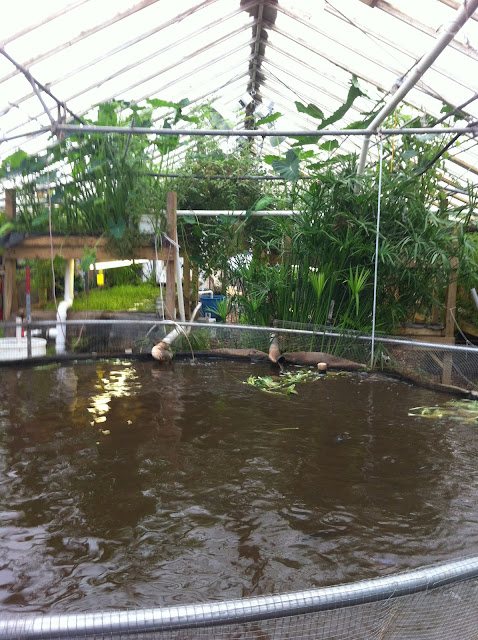On our drive from Vancouver to Toronto we were able to visit Growing Power in Milwaukee. This organization is amazing! We had a really in depth tour from one of the staff who shred lots of the organization's history and current focus. The project started in 1993 when Will Allen bought a 3 acre historic farm - the only remaining agricultural land within city limits. The neigbourhood around the farm was a food desert with few grocery store options in the area and few transportation options to access other options. The farm operated as a roadside grocer for the community - providing fresh healthy produce for those in the neighbourhood. The project became a youth employment program providing training and paid work for youth in the community as well as service learning opportunities for local college students and farming interns.
The work they do is incredible - with a focus on building healthy soils they have a large vermicomposting operation and they are also doing some really innovative aquaponics systems. They now have farms across Milwaukee (with a goal of 20,000 gardens in the city!), neighbouring towns like Oak Creek and a satellite office in Chicago with some great urban farming projects. THe Milwaukee office has some innovaitve corporate partnerships, runs 8 school yard farms and also has a Green Jobs training program that builds hoop houses for sale.
Their goal is to provide equal and even access of good quality food for everyone and really propagate the idea of growing food sustainably. They offer really great workshops, courses, tours and a fall conference - so if you can find your way there, I recommend it! Here are a few highlights from the tour.
Healthy Soils
Growing Power composts over 400,000 lbs of food that is donated each week from corporate partners around the city. They maintain a focus on building healthy soils - we can't have nutritious foods with out nutrient dense soils. We saw a few different methods of composting on site, pictured above is a long line of compost bins where the compost gets turned and moves from each bin as it continues to break down. The pots are all growing greens - they had been recently moved inside. They truly grow wherever they can. Finished compost is fed to worms to create vermicompost. They use this in their own production as well as sell it in their store front.
Worm Tea
The compost is also used to create worm tea as pictured above. The tank is filled with water and a small amount of compost is added alongside some unsulphered molasses. The mixture is aerated and the aeration mixed with the molasses food source helps to multiply the amount of healthy bacteria in the tea. The finished tea is then used as a fertilizer and fro improving the biology of the soil.
Mushroom Production
Inside a lot of the hoop houses (there are 10+ at the Milwaukee site!) there are hanging mushroom baskets. They are really making use of all their vertical space. They also grow mushrooms using large boxes made out of old pallets that were smartly tucked away in some unused corners. One exciting thing I saw was hanging shiitake logs above the aquaponic tanks - they work well since the logs really like a moist environment, and the space between the fish tank and the above grow bed goes largely unused.
Aquaponics
Growing Power had lots of aquaponic systems set up, mainly growing tilapia and a few types of perch. The fish waste is converted by bacteria into available nitrogen for the plants and the water is filtered through a grow bed - the plants take up that nitrogen and in exchange are filtering the water for the fish. The system pictured here is absolutely the largest system I have ever seen. This pool has 12,000 gallons of water! There are 4,000 tilapia growing in this system and the grow beds that filter out that water run the whole length of the greenhouse. Lots of nasturtiums, tomatoes, taro and watercress filtering out the good stuff.
Hotmash & Goats
The hoophouses are unheated so to keep them warm over the cold Wisconsin winters the sides of the houses are piled up with a mixture of spent grain mash from local breweries and manure. The farm has several goats that they keep mainly as a source of manure and as an educational component - no milk or meat. They also have a chicken house that provides eggs, but they also value the chicken manure. With these manure sources, they don't have to rely on any purchased sources of fertility which is amazing.








No comments:
Post a Comment